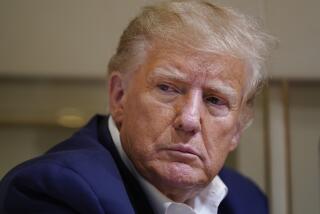Witness Says Poindexter Did Not Hide Missile Deal : Iran-Contra: But CIA official testifies former White House aide omitted facts during briefing of lawmakers.
- Share via
WASHINGTON — A veteran CIA official testified Friday that former National Security Adviser John M. Poindexter did not attempt to cover up a controversial 1985 shipment of U.S. Hawk missiles to Iran that led to the Iran-Contra scandal.
But Norman H. Gardner Jr., a congressional specialist for the CIA who was present when Poindexter briefed members of Congress in 1986, said that Poindexter omitted some facts during the session, including former President Ronald Reagan’s written authorization of the shipment.
Gardner appeared as a defense witness as Poindexter’s trial completed its third week. The former White House official is charged with five felonies for allegedly conspiring to cover up the scandal, obstructing congressional inquiries and making false statements to Congress.
Three of the counts involve charges that Poindexter misled members of the House and Senate intelligence committees by falsely claiming that neither he nor any other U.S. official had prior knowledge of a shipment of U.S. Hawk missiles from Israel to Iran in November, 1985. The arms shipment was intended to help free U.S. hostages in the Mideast.
Although the prosecution presented earlier witnesses to back up the charges, Gardner said that Poindexter told legislators during the Nov. 21, 1986, meeting that “we did not have all the facts about that flight” and that some U.S. officials may have had prior knowledge of it.
Gardner conceded that Poindexter, however, never told members of Congress about Reagan’s written authorization for the 1985 shipment, known as a presidential “finding.”
“Did anyone ask him about a finding?” inquired Joseph Small, a lawyer for Poindexter.
“No, they did not,” Gardner replied.
Gardner said that Reagan signed the finding, which was drafted by the CIA, two months after the shipment on Jan. 17, 1986. Other witnesses have said the CIA recommended the presidential action because Congress had forbidden any shipment of U.S. arms to nations that supported terrorism unless the President issued a finding that such a shipment was in the national interest.
Previous evidence at the trial has shown that Poindexter tore up the finding in late November, 1986, because it linked the arms shipment to attempts to free U.S. hostages, a statement that conflicted with Reagan’s pledge that he would not negotiate for hostages.
Gardner drew an expression of skepticism from U.S. District Judge Harold H. Greene when he said a chronology that Poindexter had helped prepare stated truthfully that the CIA believed the shipment contained oil-drilling equipment.
“The CIA shipped something to Iran, to a hostile country that was almost at war with the United States, and the CIA didn’t know what was in there?” Greene asked, frowning.
“That’s right,” Gardner replied.
He said that at the request of Marine Lt. Col. Oliver L. North, an aide to Poindexter, the CIA arranged for one of its chartered airlines to fly the shipment from Israel to Iran. North had described the cargo as oil-drilling equipment, Gardner explained.
At the last moment, however, the crew of the airplane became aware that the cargo was actually missiles and reported that information to CIA headquarters, he testified.
But on cross-examination, associate prosecutor Christian Mixter pointed out that one CIA chronology reported that the agency first learned of the cargo from the Iranians.
Gardner testified this was incorrect, declaring: “There was a great deal of confusion about the flight.”
More to Read
Sign up for Essential California
The most important California stories and recommendations in your inbox every morning.
You may occasionally receive promotional content from the Los Angeles Times.













